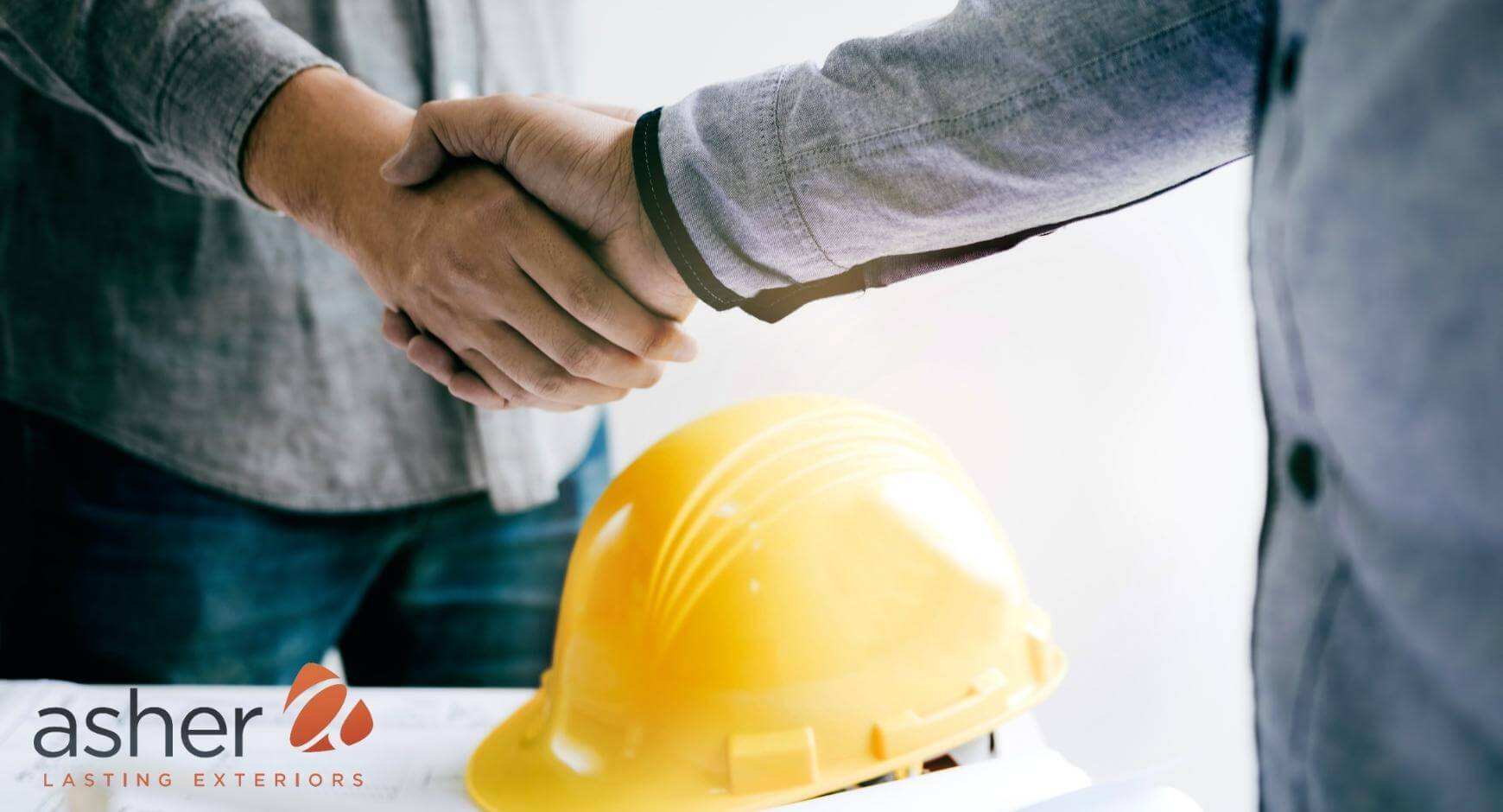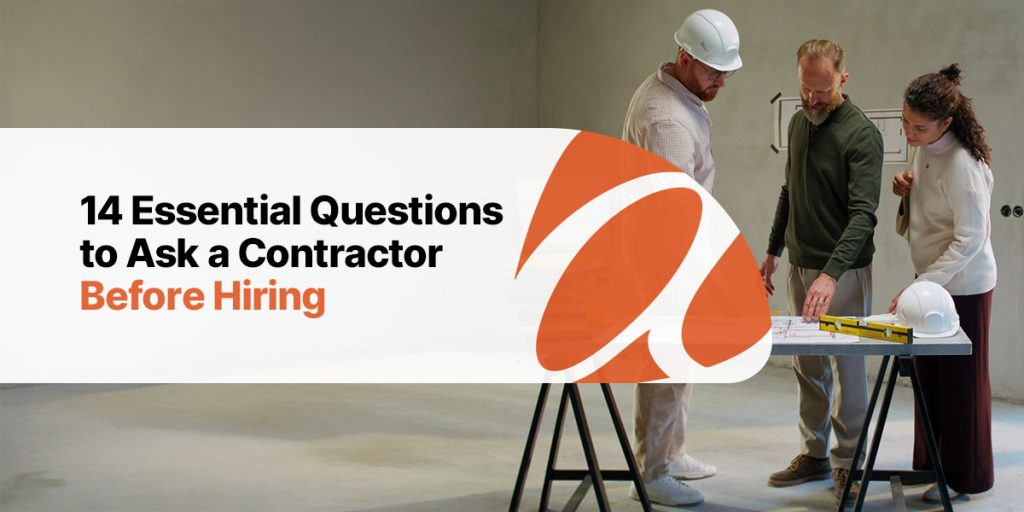Knowing the right questions to ask a contractor before hiring can make all the difference in the outcome of your project. We’ve compiled a list of 14 questions that will ensure you get all the information you need to know your home is in good hands.
Renovating your home can be a huge financial investment, so it’s important to get to know your contractor before you begin. Meeting with a contractor to get a quote before a big project is common in the industry, and you may end up meeting with several. To find the best team for the job, you’ll need to know all the right questions to ask a general contractor.


Have questions for a contractor? Contact Asher’s exterior remodel experts for quality advice from the top industry specialists.
14 Questions to Ask Your Contractor
If you have never worked with a contractor before, talk to your neighbors, friends, or family to ask for a reference for a contractor. Don’t try to DIY without a permit, and be aware of the home improvement scams when looking for a contractor. Once you have a few good options, set up for a consultation or two. Here are the essential questions to ask a contractor before hiring them.
1. Do You Have a Contractor’s License and Insurance?
Out of all the questions to ask a contractor, this one may be the most important. A contractor without the proper license or insurance can put you at great financial risk. The license requirements will vary depending on your state, but it’s always safer to bet on the contractor with additional licenses than the ones that only meet the minimum requirements.
A contractor without insurance is a huge red flag. You’ll have to assume liability for their safety, covering all the costs associated with any accidents that occur on your site. At the very least, they should have workers’ compensation to protect you from expenses due to injuries. At Asher Lasting Exteriors, we have HomeAdvisor’s Seal of Approval, which means we’re fully licensed and insured. You can feel confident your project is in safe, professional hands with us as your contractors.
2. What’s Your Background and Experience?
Put this question at the top of your list of contractor interview questions, as it makes a good ice breaker, and will tell you if they’re a good fit for your project type. Find out how long they have been in business and also how many projects they have completed. Time in business does not always equal experience, so it’s important to get their total projects as well.
You can ask them about past projects that may have been similar to yours to see if the contractor was able to get them done on time. Don’t be afraid to ask for specifics as you gather these key bits of background information.
- Time in business
- Number of completed projects
- Past projects similar to yours
These are essential points to know before hiring a contractor. With 50 years of experience and thousands of successful projects, the professionals at Asher Lasting Exteriors bring extensive expertise to every exterior project.
3. Can You Provide a List of Past Client Referrals?
Feel free to ask for referrals, reviews, or testimonials from your contractor. Any good contractor will be happy to let their work speak for itself, so listen to what their clients have to say. You can also do some research on sites such as Angi, HomeAdvisor, and social media to see what their customers or past employees have to say about them.
As with all reviews, there may be two sides to the story. If there’s a particularly bad review, ask your contractor about it to get the full picture. When looking for past referrals, start with these three first:
- Check the contractor’s website
- Look them up on Angi or HomeAdvisor
- Scroll through their social media accounts
We encourage you to check out our customer reviews and testimonials from previous satisfied customers. We also have several awards, including recognitions from Angi and HomeAdvisor, which are a testament to our quality work and excellent service.
4. Will You Take Care of Permits?
Another essential question to ask a general contractor is whether they handle permits or not. Not every job will require permits, but they are a necessity for any job that fundamentally changes the structure of your house. Any professional contractor will know what kinds of permits are needed and how to get them, but a great one will also be willing to pull them for you.
Obtaining the proper permits can involve some additional costs and time. Having an experienced professional handle the process of getting permits and scheduling inspections will allow your job to run more smoothly. Permits are common for:
- Building projects
- Plumbing and electricity
- Special projects like fireplaces and decks
Our team will handle all the necessary permits and inspections to ensure that your project meets local codes and runs smoothly from start to finish.
5. What Is Your Schedule?
Asking a contractor for their schedule is a good way to determine how organized and diligent they are about their work. A contractor who doesn’t lay out a set schedule beforehand can easily slide into a mismanaged workflow that could drag out for weeks and cost you a lot of time and money.
When work is being done on your home, you want to know when the crew will arrive and leave each day. Also, provided milestone schedules will show they are on track to finish within the agreed-upon timeline. At Asher Lasting Exteriors, we understand the importance of staying within project timelines. We’ll provide a detailed project schedule and keep you informed at every stage.
6. What Is Your Estimated Timeline for Completion?
While project timelines are subject to change, your contractor should be able to give you a good estimate of how long it will take to finish a job. You can ask for a schedule that gives you your completion date and a couple of milestones so you can make sure you’re on track.
In most cases, projects tend to run long, so you may want to inquire about any projects your contractor has set up for the future. You don’t want your contractor to run off before your project is finished because they have to set up another job. We have a proven record for completing projects on time and communicating promptly if any changes lead to delays.
7. Will There Be Subcontractors on This Project?
A large contractor that has several projects going on at the same time might manage all the work by hiring subcontractors for each job. This can make it difficult to know exactly who is working on your job, and subcontractors could change mid-project. For that reason, the use of subcontractors is one of the red flags to look for before hiring a contractor.
At Asher Lasting Exteriors, we don’t hire any subcontractors. Each technician who works on your project is a member of our team and trained according to Renewal by Andersen standards.
8. What’s Your Method of Contract Delivery?
Contract delivery is how the contractor breaks down their services and comes up with an offer for their part of the contractual agreement. To know how to respond to a contractor’s quote, you’ll need to know the three main types of contract delivery methods. While most contractors have their preferred method, some may be flexible if you have a different preference.
Guaranteed Maximum Prices
With this delivery method, the contractor and you both agree that the project won’t exceed a certain amount or guaranteed maximum price. The contractor gives you a breakdown of all the costs associated with the project for you to sign off on.
If the project comes in under budget, then both you and the contractor share the excess — a win-win method that most people prefer.
Lump-Sum Delivery
This is the most common contract delivery method because it’s the simplest. With a lump-sum delivery, the contractor bids one fixed price for the project and doesn’t break down the costs for the homeowner.
If there are excess funds at the end of the project, the contractor gets to keep them. Depending on how smoothly the project goes, this method can be either a win or a loss for you.
Cost
Cost is calculated as the total cost of the project plus the contractor’s profit. It may seem ideal because everything is laid out before you, but it can put you at a disadvantage. You will be responsible for covering the cost of any delays or surprises you find along the way.
9. How Will Payment Work?
Once you have agreed upon a contract delivery method, you can ask about the payment schedule. Most contractors will ask for payment before a project begins, but you should discuss and agree upon a set schedule.
Typically, payments are made after each project milestone completion, with the last payment being made when everything is complete. A payment schedule will not only ensure your project’s completion but also help you with your own financial organization. We offer clear, detailed quotes as well as flexible payment schedules and financing options to fit your budget.
10. How Do You Prefer to be Contacted?
Effective communication is the cornerstone of any successful renovation project. If you have contract questions or answers and can’t reach your contractor, that means their team likely can’t reach them either. It’s essential to ask contractors about their preferred communication channels beforehand.
Look for contractors with a well-established communication protocol. Those who have adapted to using the latest technology will be able to share plans and drawings instantly with members on site. Great communication can save you time, money, and countless headaches.
11. Will You Clean Up? (Be Specific)
The definition of clean isn’t going to be the same for everyone, especially for those who work in dirt and sawdust all day long. It’s up to you to decide if you’d like the site cleaned at the end of every day, or just at the end of the project. Keep in mind that the time contractors spend cleaning is time you’ll be paying for and could push your project timeline further out.
If the work is being done inside your house, you can implement a few measures to keep things clean. For example, you can cover vents and doorways with plastic to reduce the spread of dust from cutting and sanding.
Our team will help keep your space clean by removing old materials and debris and thoroughly cleaning up after we complete the project.
12. Is There a Warranty for the Services and/or Materials Involved?
Out of all your home repair questions and answers, this is the one you’ll want to hang on to for a long time. You should ask your contractor for specific warranty details on any fixtures or electrical components before you agree to their installation.
Construction work itself can be highly technical and is typically backed by the industry-standard one-year warranty. During this year, you can call your contractor to take care of any work that wasn’t executed properly in the initial project. The warranties for both the materials involved and services rendered should be documented and kept until they expire.
Common warranties include the following guarantees:
- The work is performed well
- The materials used are new and high quality
- Contractors will correct issues and defects within one year
At Asher Lasting Exteriors, we stand behind our work with industry-leading warranties for materials and installation.
13. How Do You Resolve Disagreements?
This may not be the most comfortable question to ask a general contractor, but contractual disagreements are common in the industry. A good contractor should have a solid structure in place for resolving disputes before they get out of hand.
Common construction dispute resolution techniques include negotiations and compromise, mediation, and expert input. Your contractor should have a professional method for resolving disagreements. If your contractor doesn’t have an answer to this question, you may want to find someone who does before the questions get much more difficult.
14. Will You Take Steps to Protect My Property?
All home renovation projects start with some amount of demolition. It’s a good thing to ask what measures your contractor will take to ensure the rest of the house stays intact. There are a few things you can do, like relocating items and tarping over furniture to avoid damage.
However, a lot of the responsibility lies on the contractor to avoid scratching wood floors, staining carpet, or damaging the surrounding walls. You may also need to ask them to lock up when leaving the property if you won’t be home that day. It’s nobody’s favorite contractor question to ask at an interview, but it’s good to know your key areas are covered.
- Covering furniture with tarps
- Locking doors when leaving the property
- Relocating items to avoid damage

Have Questions for a Contractor? Contact Asher’s Exterior Remodel Experts
Knowing what to ask a general contractor before hiring is half the battle. Once you feel certain of what to ask when hiring a contractor, we hope you’ll reach out to quiz us before your next project.
At Asher Lasting Exteriors, our team of professionals provides top-notch customer service and expert-level installation of industry-leading products. Visit one of our showrooms to see the high-quality products we proudly serve customers. If you’re looking for more home repair questions and answers, check out our FAQ page or our blog for the latest updates. Explore our customer reviews and request a free quote today.
